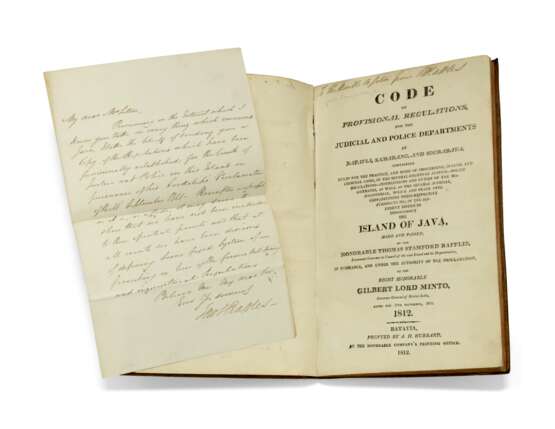ID 519373
Lot 82 | Sir Thomas Stamford Bingley Raffles (1781-1826)
Estimate value
£ 10 000 – 15 000
Code of Provisional Regulations for the Judicial and Police Departments at Batavia Samarang and Sourabaya. Jakarta: A.H. Hubbard at the Honorable Company's Printing Office, 1812.
Raffles' presentation copy of his code of laws for Java, which he had drawn up and passed under the authority of Lord Minto, Governor-General of India. Raffles' ability and knowledge of the Malay language impressed Minto, and he was sent to Malacca. The global reach of the Napoleonic Wars meant that Raffles mounted a military expedition in 1811 as part of the British campaign against the Dutch colonies in Java that were now under French Napolenic rule. The British won a swift victory, and Minto appointed Raffles as Lieutenant-Governor of the Dutch East Indies. In this role, Raffles wrote and instituted this legal code, and this is the author's presentation copy to the distinguished East India Company administrator Archibald Seton (1758-1818), complete with an accompanying. Seton, who had previously been Resident in Delhi from 1806 to 1811, took part in the invasion of Java as the newly-appointed Governor of Prince of Wales Island [Penang], before being promoted in 1812 to a seat on the Supreme Court of Bengal. Raffles's letter refers to Seton's interest in 'every thing which concerns Java', and notes of his new legal code that 'imperfect as it is, as a Code, it may serve to shew that we have not been inattentive to these essential points and that at all events we have been desirous of defining some fixed system of proceeding in lieu of the former Arbitrary and inquistorial Regulations'. Extremely rare: the only copy we have been able to trace in the UK is held at the Royal Asiatic Society; 6 other copies are recorded in institutions, all of them in the Netherlands.
Folio (315 x 195mm). (Lacking pp.137-152.) Contemporary pigskin (new endpapers).
| Address of auction |
CHRISTIE'S 8 King Street, St. James's SW1Y 6QT London United Kingdom | |
|---|---|---|
| Preview |
| |
| Phone | +44 (0)20 7839 9060 | |
| Buyer Premium | see on Website | |
| Conditions of purchase | Conditions of purchase |



